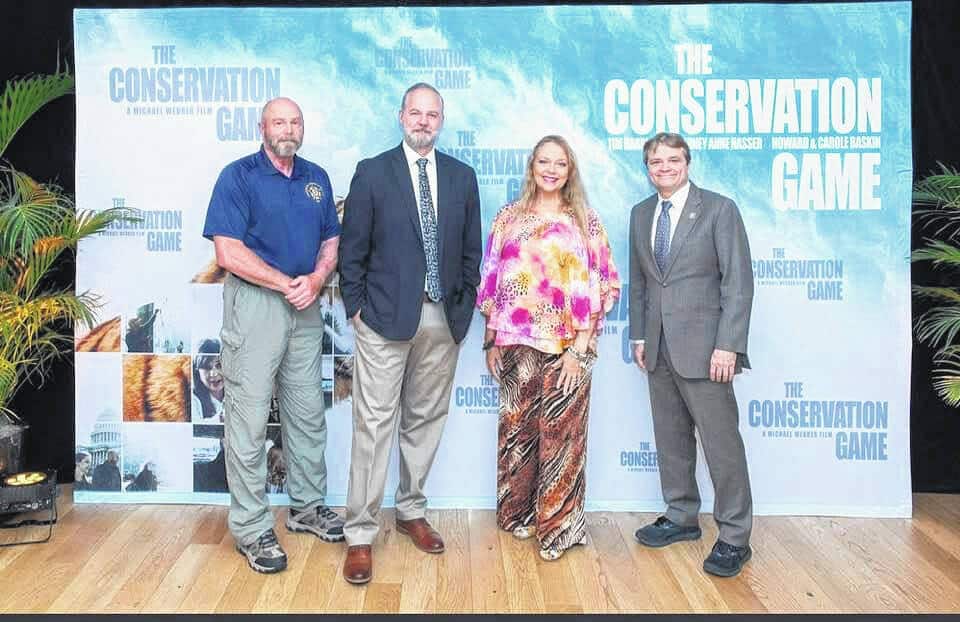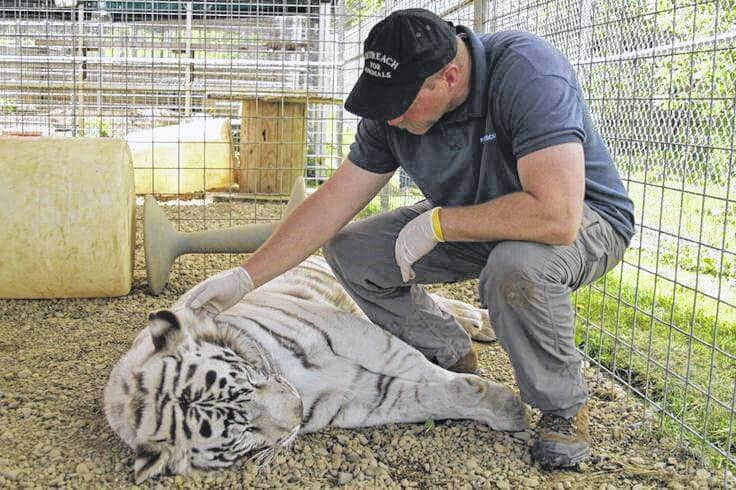
Timothy Harrison, left to the right, Director Michael Webber, Carol Baskin and Congressman Mike Quigley following a screening of “The Conservation Game.”
Courtesy photos

Harrison prepping a white tiger for surgery.
Courtesy photos
TROY — Troy native Timothy Harrison, 66, returns on Thursday, Dec. 15, to Brukner Nature Center for a discussion about the two documentaries he has starred in, “The Elephant in the Living Room” and “The Conservation Game,” and for a book signing of his newest book, “White Magic: The Curse of the White Tiger.”
Harrison originally became interested in animal conservation efforts when he volunteered at about 16 years old to help clear paths for the newly-opened Brukner Nature Center. While he and five other students from Troy High School and Miami East were clearing paths, someone brought in baby raccoons that were abandoned and needed help. Since Harrison had grown up on a farm and had experience taking care of raccoons, he offered to help. His help with those raccoons and his efforts to get veterinarian Dr. Thomas Bird on board sparked the animal rehabilitation program that BNC is now known for.
Working with Bird at BNC and outside of the nature center is where Harrison first began learning about exotic animals and the problems that stem from them being kept as pets. During his time with Bird, he experienced numerous calls from first responders for Bird to come help with containing and rescuing exotic animals. After Bird left, Harrison still received these calls and went on to work with multiple local hospitals before starting as an officer, firefighter and paramedic in Oakwood.
Around the time he became an officer, reality TV around exotic and wild animals became popular and the calls for exotic animal rescues jumped from a few calls a year to over 100 in one year, according to Harrison.
During his 29 years as an Oakwood Police officer, Harrison started attending various conferences to teach defensive tactics. According to Harrison, almost every officer he met had a story regarding an incident where they were the first responders on an exotic animal call.
“Police officers are always the first ones on the scene if there’s a tiger loose, or a bear loose, or a chimpanzee loose. It’s not the zoo and it’s definitely not Jack Hanna, it’s definitely not any of the people on TV. It’s always the local police department and they aren’t trained to do it,” said Harrison.
After realizing the lack of training and the fact that local law enforcement officers are always first on the scene in these instances, Harrison began travelling to various cities to help pass legislation and educate communities on the dangers of owning exotic animals as pets. During this time, he also started a nonprofit called Outreach for Animals in 2001. The organization initially started with law enforcement and first responders and has, over time, grown to include emergency room staff members and lawyers that provide legal assistance to the organization.
He started to push to educate communities and rescue these animals that should not be kept as pets. One of the ways he tried to educate people was by going on local and national TV, including shows on Animal Planet, to introduce the animals he had rescued and explain why they should not be kept as pets.
“I just didn’t like the feel of it … I’d put the jungle hat on and do all that kind of stuff. It got to a point where I didn’t like the feel of it and I noticed that I wasn’t getting the information I wanted out, so I wrote my first book,” said Harrison.
After his first book, “Wild Times: Tales from the Suburban Safari,” was published, he connected with a fellow conservationist in California, Tippi Hedren of The ROAR Foundation and Shambala Preserve, who was trying to get legislation called The Big Cat Act passed. Harrison contributed to the legislation by adding a public safety aspect that includes a requirement of a permanent barrier that would prevent public contact with the animals or that all animals on display must be kept at least 15-feet-away from the public. The public safety aspect of the legislation also served to remind legislators that police and other first responders are always the first on scene in instances regarding exotic animals and that the additions of safety measures would help protect them. The bill originally passed the House in 2020, but due to the pandemic, it was stalled and could not move any further causing Harrison and his team to have to restart their efforts.
The bill recently passed the Senate on Tuesday, Dec. 6, 2022, and moves to be signed by President Joe Biden. Not only does the bill prevent public contact with the animals, it outlaws the ownership of big cats as pets and keeps them from being used as photo opportunities. The legislation explicitly prohibits any means of acquiring big cats through local or foreign commerce. Possession of big cats is now limited to wildlife sanctuaries, universities and certified zoos. While the bill stops any further acquisition of big cats, it allows individuals who already own the animals to keep them. However, these owners are prohibited from breeding or selling the animals. Owners are also not to allow public contact with the animals and must register the animals with the U.S. Fish and Wildlife Service.
“My favorite saying is that people are loving them to death. They’re loving them so much they think they can bring them into their homes and it doesn’t work. I’ve rescued hundreds and hundreds of big cats and bears,” said Harrison.
“I am a human-animal advocate, in that order. I help to save the humans, for 50 years I have never had a human being get hurt or an animal get hurt rescuing, doing surgery or helping these animals. And also, we’ve never had a repeat. We’re the only group that can say that. The people that I helped to remove the cat from their property, ones that have attacked them or escaped, they never repeated. They never went back and bought another cat,” said Harrison.
His first two books sparked the creation of the first documentary, “The Elephant in the Living Room.” Initially, Harrison was wary of creating a documentary because he had grown out of being on TV because he “respects the animals too much.” Finally, he agreed to doing the documentary Michael Webber. The filming for “The Elephant in the Living Room” lasted about six months. Webber then took the 45 minutes of film and entered the documentary into the Silverdocs International Film Festival and won. The funds from this win and the American Cinema Editors award win funded the entry of “The Elephant in the Living Room” into the Genesis Awards in 2011, which the documentary won.
His newest book, “White Magic: The Curse of the White Tiger” and his newest documentary, “The Conservation Game” go hand-in-hand in their efforts to bring awareness to and end the ownership, breeding, selling and trading of big cats in America. His book and documentary have made big changes in the conservation efforts in the U.S.
Since the release of “The Conservation Game,” multiple zoos across the nations have stepped forward and made claims to change the way they treat wild and exotic animals. The documentary even changed the minds of U.S. politicians who were originally actively working against Harrison and Outreach for Animals during their fight to pass the Big Cat Public Safety Act.
“We showed the film in Columbus … they had a huge group of ex-Columbus Zoo employees, veterinarians, everybody else right in the middle with their sweatshirts on and they were so mad, (claiming) ‘you don’t know what you’re talking about!’ I said, ‘whoa, whoa, whoa — wait ‘til the film’s over; we’re having a panel.’ That’s what I always tell people, I don’t even have to say anything. Just watch the documentary … after it was over with, there wasn’t a dry eye from any of them and they all gave me their cards saying, ‘we want to work with you, we want to change things, we want to make things better for these animals,’” said Harrison.
Harrison would like to invite the community to join him at Brukner Nature Center on Thursday, Dec. 15, at 7 p.m. to discuss his new book and documentary as well as the Big Cat Public Safety Act that just passed the Senate. He encourages everyone to watch “The Conservation Game” before attending and to bring and questions regarding the documentary, legislation or his work to the book signing.


